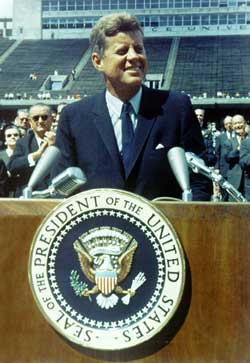 It’s easy to talk about customer service when patents are nice. Our real motivation surfaces when patients demand narcotics, CT scans, or useless antibiotics. Patient threats, intimidation, and entitlement wear down the fiercest advocates of patient service.
It’s easy to talk about customer service when patents are nice. Our real motivation surfaces when patients demand narcotics, CT scans, or useless antibiotics. Patient threats, intimidation, and entitlement wear down the fiercest advocates of patient service.
Unless we commit to great service for our toughest customers, we will start to question whether any patients deserve our attention.
In the 1960’s race to the moon, John F. Kennedy said,
“We choose to go to the moon in this decade and do the other things, not because they are easy, but because they are hard, because that goal will serve to organize and measure the best of our energies and skills, because that challenge is one that we are willing to accept, one we are unwilling to postpone, and one which we intend to win, and the others, too.”
Why bother?
1. Patients matter.
Nurses and doctors entered training to help patients. Nearly 100 years ago, Peabody complained that new physicians relied too much on science and had lost “an interest in humanity”. It’s been said recently that medicine has become “far more interested in diseases than the people who suffer from them” (A. Miles, 2009). Cassell’s classic book on medicine advocates for ‘person centred care’. “The Nature of Suffering and the Goals of Medicine“ (Oxford University Press, 1991, 2004).
2. Great service improves outcomes.
Waiting kills patients; over 400 articles demonstrate increased morbidity and mortality from waiting, just in the ED. Qualitative aspects of service are harder to measure, but things like patients’ trust in their providers improves outcomes, too. Trust requires great patient service.
3. Medico legal claims drop.
Long waits increase the chance of being sued. Again, waits get reported because they can be measured more easily than qualitative experience. Virgin media found customers more satisfied with polite service that didn’t fix a problem than rude service that did.
Expectations
Some of us entered medicine thinking we would be textbooks of physiology, that we would have respect, and have grateful patients. Instead, we trained in a field with ineradicable uncertainty, a society that leans toward general disrespect for all kinds of title and authority, and patients we often cannot help.
We choose to care for patients, not because it is easy, but because it is hard…
[Please consider signing up for 2 posts per week to your email. You can cancel anytime. Thank you!](photo credit: rice.news.edu)
